Thank you for sending all your wonderful feedback and comments on our last post – Colonial Cuisines of Assam. In this article I have woven in a tiny anecdote from Mr S. Sharma’s note. That era of monsoon dance nights at the club, drinking a ‘Jaleel special orange squash’ after a round of golf at the Digboi golf course, waking up to fresh flowers on the breakfast table everyday made me revisit my personal history book for more on a lifestyle that worked around Garden Time which is one hour ahead of the Indian Standard Time due to the fact that the sun rises so early in the east.
Telephones were introduced in the tea plantations of Assam around the late 40’s – early 50’s. The calls had to be booked and when the telephone rang the whole bungalow knew. Children along with the family pet ran and stood around the phone waiting for the grown ups to answer. If the Sahib or Memsahib was out then the bearer took the call. Berah as pronounced in the gardens, performed a function similar to that of a butler. Most berahs were told to keep the conversation brief and to the point.
Once during the rainy season a manager who was at a party some two hours away from his bungalow called his berah and informed that the family was only going to return home the next morning. A little while later his wife realised she needed to instruct the cook about the next day’s menu and called her bungalow. The conversation went like this –
” Hello” said the lady
” Sahib is out” said the bearer and hung up
After the second try the lady decided to change her tactics.
” Where you calling from?” she asked
” From my mouth” came the reply before he put the phone down again.
Everyone who has worked in the tea estates as a manager/ an assistant or as medical officer and their wives will have a plethora of stories to tell about their staff. The ones about the bearers are legendary. Most tea estates are situated in the interiors isolated from towns and cities. In the hey days of tea in Assam till about the late1990’s’s each tea bungalow was assigned a retinue of domestic help to make the stay of the managers more comfortable. Attached to the bungalows were large flower and vegetable gardens beside sprawling manicured lawns. There were certain standards that were expected to be maintained in the upkeep of the property. Mandatory to host parties regularly and arrange club do’s and events were a part of duties assigned to tea wives. The baboorchi (cook), the bearer, the head gardener and the nanny known as Ayah (the only woman) along with their helpers were crucial for this. Most times the cooks were the talented Mog cooks whose cooking as outstanding and if they dipped a little into the Sahib’s alcohol stock, it was overlooked. 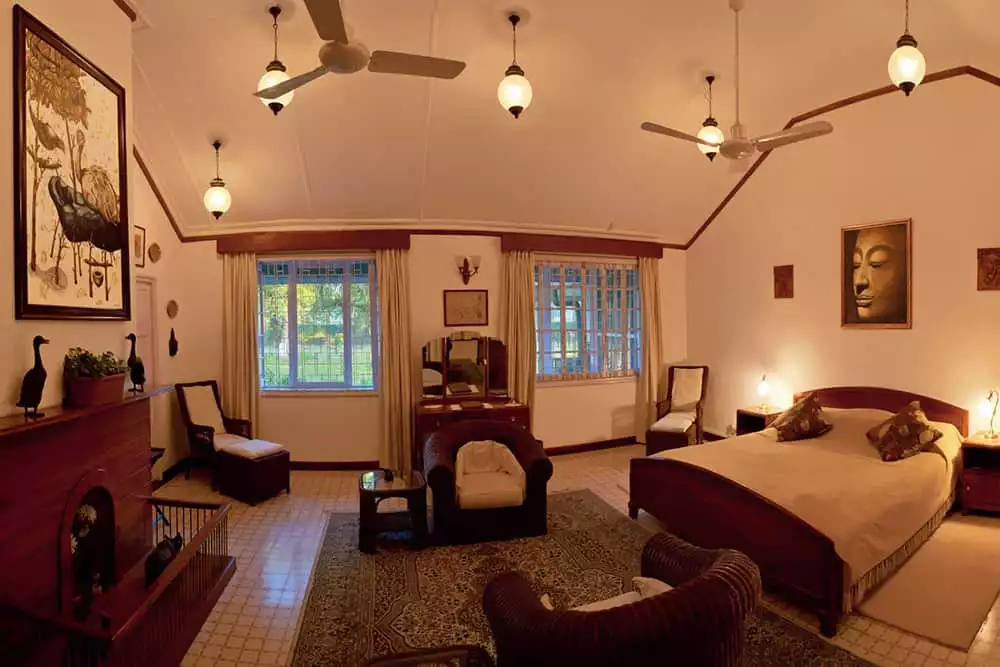 Heritage Bedroom
Heritage Bedroom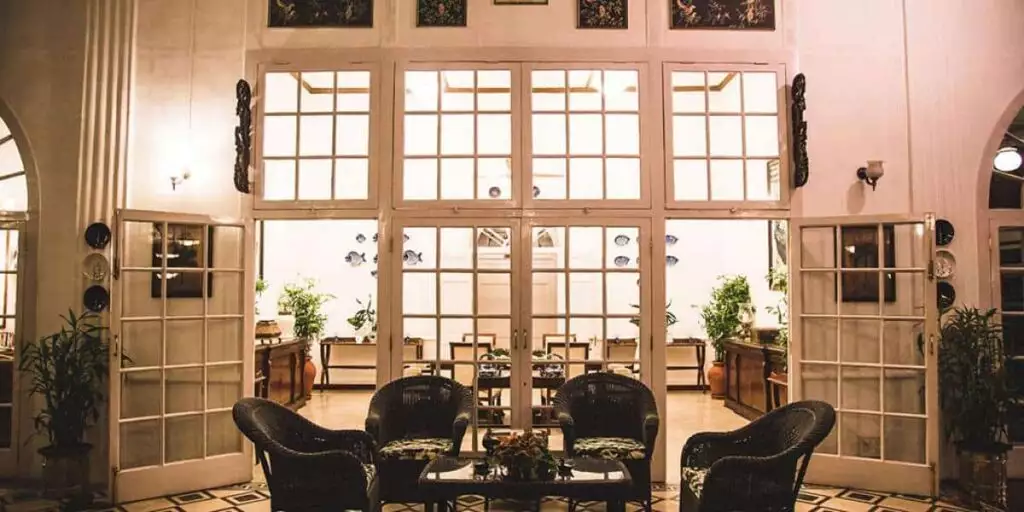 View of the dining room from the veranda, Wild Mahseer
View of the dining room from the veranda, Wild Mahseer
The highlight of life in the interiors was club do’s which had their genesis in colonial times. These spaces were refuge to provide the Europeans a sense of home, to socialize with other westerners and indulge in the sports of the old country. Golf, tennis and swimming events and inter club competitions had many takers and always ended with sumptuous lunches and high teas. Movie night was another highlight which happened in some clubs. Once a week an English movie reel use to be procured from the nearest big town and projected in the theatre room. The library room was quite popular as television was a few years away and borrowing books and magazines helped while away the long plantation hours.
Most staff in the clubs and bungalows were recruited from amongst the tea labour. It is a wonder how the British memsahibs who barely spoke the local language managed to train their staff so well. From setting the perfect dinner table for a six-course meal with matching serviettes and flowers, techniques of European cooking, preserving vegetables for off season use, polishing red oxide and wooden floors till one would could almost catch their reflections, to setting up flower and vegetable gardens to replicate exactly the gardens in
England. Please note that all this was alien to the tea labour who were descendants of tribal and backward castes brought by the British between 1860 and 1890 from present day Jharkhand, Orissa, Chhattisgarh, West Bengal and Andhra Pradesh to work in the newly formed tea gardens of Assam.
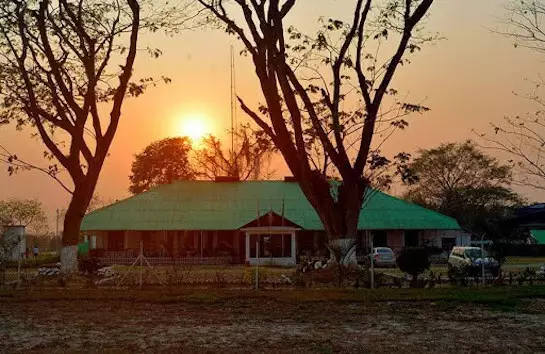 Misa Polo Club
Misa Polo Club
A visit to Misa Polo Club which was established in 1888 for the planters and British District Administration heads takes one back in time. The club was used by the US Army when they were temporarily stationed in Misa during World War II. The wooden floors were polished with a man sitting on a cloth and two others dragging the cloth up and down the length of the room. The tea planters in Assam learnt the game of polo from the royal family of Manipur and started a few clubs in Assam dedicated to this sport. For the Europeans in those days horse riding was a part of their daily lives so this was an attractive add on. In some old images at Misa Polo club, I have come across images of the local Indian players from the region dressed up in the same traditional way as they still do in Manipur.
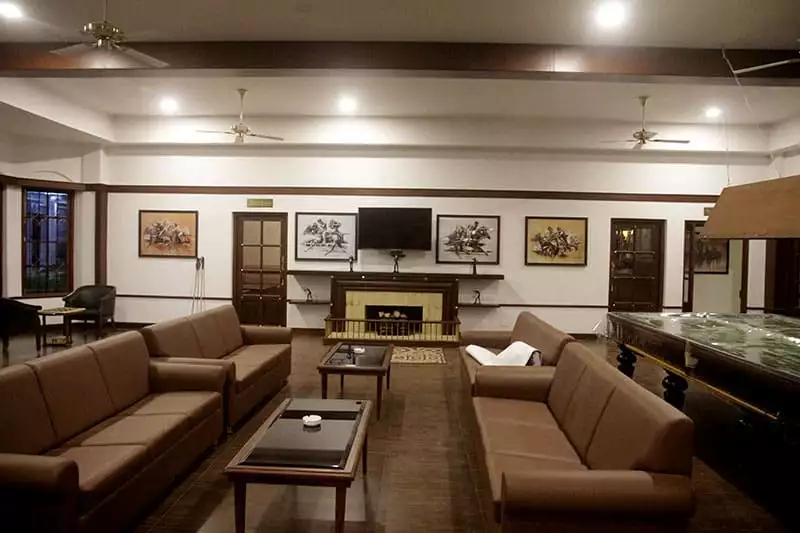 Interior, Misa Polo Club
Interior, Misa Polo Club
A 9 hole golf course, tennis courts, billiard and card rooms allows one to indulge in the same manner as in the days of the Raj. There are modern features to keep up with recent times but the old architecture and interior styling has remained. An ideal stopover for a meal or the night when driving from Upper Assam to Guwahati is Wild Mahseer, a boutique heritage property situated in the middle of the Addabarie Tea Estate near Balipara. The colonial bungalows have been decorated to keep the feel of the past alive. Large bedrooms, verandas and drawing rooms surrounded with lush green trees and lawns. From the rooms to the furniture, artefacts and table settings, it is indeed a page from the history books. You can even rent an entire bungalow which comes with its own maids to cater to your laundry and serve tea.
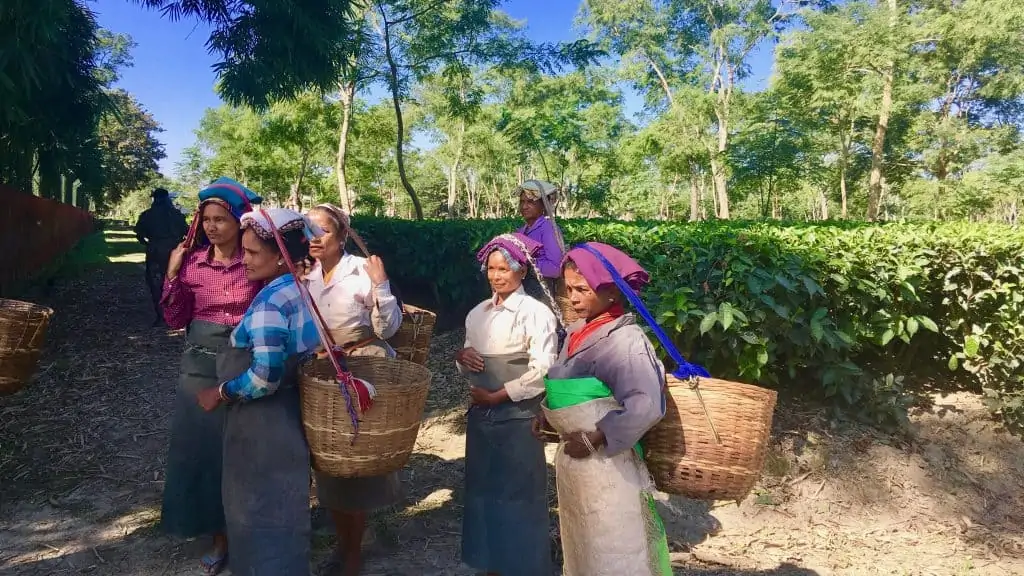 Tea pluckers, Addabarie tea estate
Tea pluckers, Addabarie tea estate
The highlight of the property is the impeccable service that takes one back to the hey days of tea life in Assam. A walk around the estate and tea tasting session with an expert, nature trails to wander in and acquaint oneself with local bird life and bonfires before wonderful meals curated around recipes from the British Raj and local Assamese cuisine add to the romance that captured the soul of men and women who left their mark in a land so far away from their own.
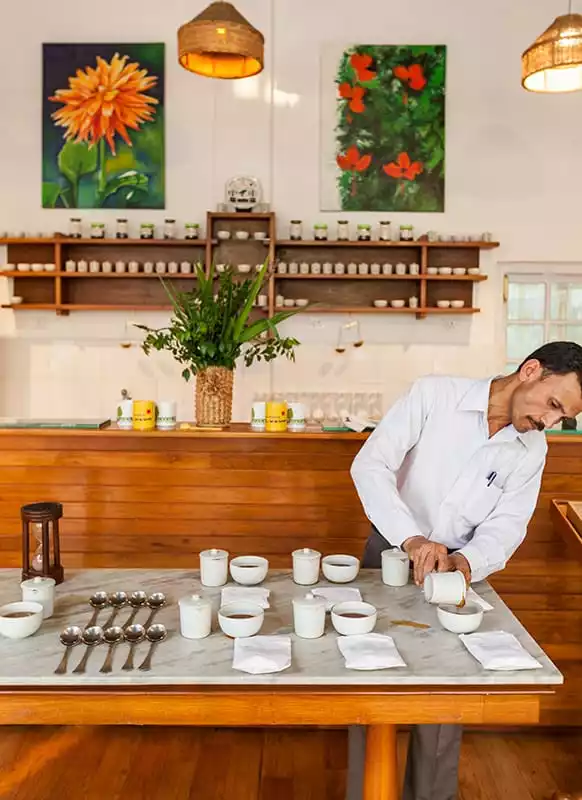 Tea tasting
Tea tasting
Another bearer tale from an uncle of mine who was the manager at Hollonghabi Tea Estate, Upper Assam;
In the early 1970’s towards the end of a dinner party at his bungalow in the estate, the bearer was summoned to be given the customary tip. When he bowed to convey his gratitude, his staff cap fell down and to everyone’s surprise onions and potatoes tumbled out. He had helped himself from the pantry and hidden these vegetables to take home under the cap. The next morning the bearer was reassigned to the factory!!
Images are our own and courtesy Wild Mahseer
Home

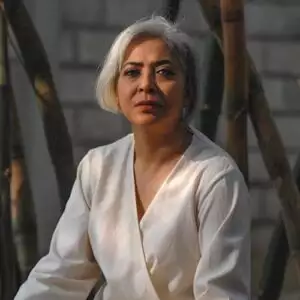
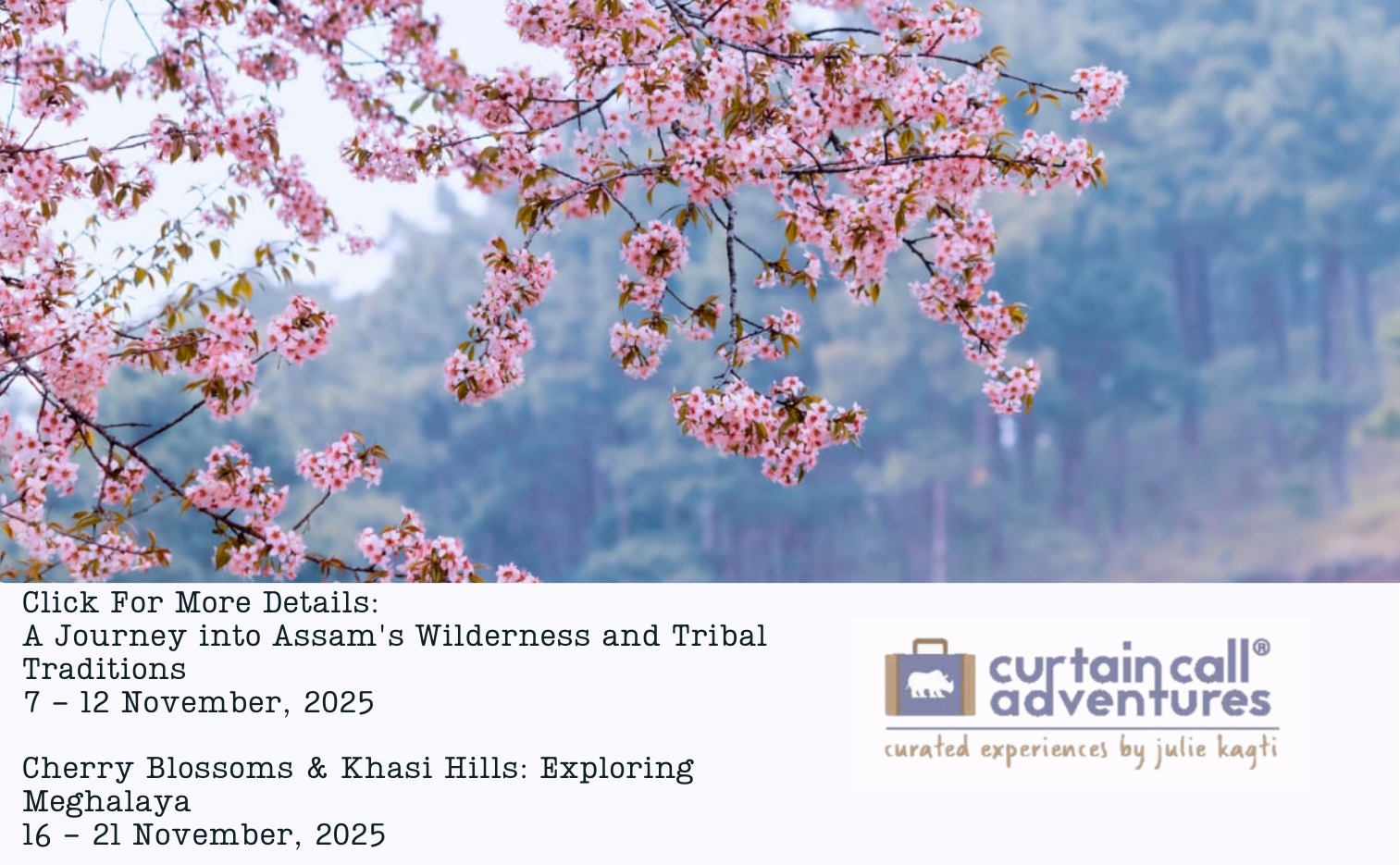
23 Responses
Great piece of work. Made wonderful reading.
Thank you for reading it and your comment.
Thank you for such vivid recollections so beautifully and accurately described.
Thanks
Well related.
Well related.
thanks
Well related.
Quite lovely Ranga, brings back so very memories for us old fogies who joined Tea in the early and mid 50’s. Sadly times have changed and “Gone are the days” leaving only the ghosts behind.
Thanks for your comment . yes the ghost alone remains
Just discovered this blog. Recommended by a fellow planter friend. Hope I can visit some day soon. Lovely photos and descriptions.
Thank you, let me know when do plan your visit, will give you some pointers.
Enjoyed reading this. I am based in Sri Lanka and we too have very similar stories and anecdotes.
Hi Jeremy, yes I did spend a holiday in Nuwara Eliya and recognised the similarities. it will be great to hear a few of your anecdotes.
I and my school batchmates had the good fortune to visit Misa Polo Club and partake of a very delicious meal on our way to Wild Mahseer this February 2020.
We spent 2 nights at Wild Mahseer and our lives cartwheeled back to the 60s/70s/80s when life in the gardens were a dreamlike existence.
An unforgettable experience for all of us which we will cherish forever!
how lovely, thank so much for sharing with me.
Julie your articles are truly precious to some of us who relive their childhood memories through these vivid descriptions and the aura you create with your writings. Thank you!
Thank you for reading and your kind words.
Brings back So many beautiful memories !!
Thank you
I walked miles down memory lane after reading this article. I have lovely memories of the Misa club when I was a ‘chota sahib’ in Kellyden Tea Estate
Thank you for feedback. would love to your anecdotes about Misa club. I am thinking of putting together a book containing incidents and anecdotes about life in the hey days of tea, coal and oil 40’s -50’s till the mid 80’s. It will be an online book open to all who share an interest for that period in time.
Julie
Your stories take me down memory lane. Having spent my growing years in this part of the country, I can relate so well to the world that you have portrayed in your stories. We were indeed blessed to have spent our childhood in these sylvan surroundings.
Look forward to more stories!